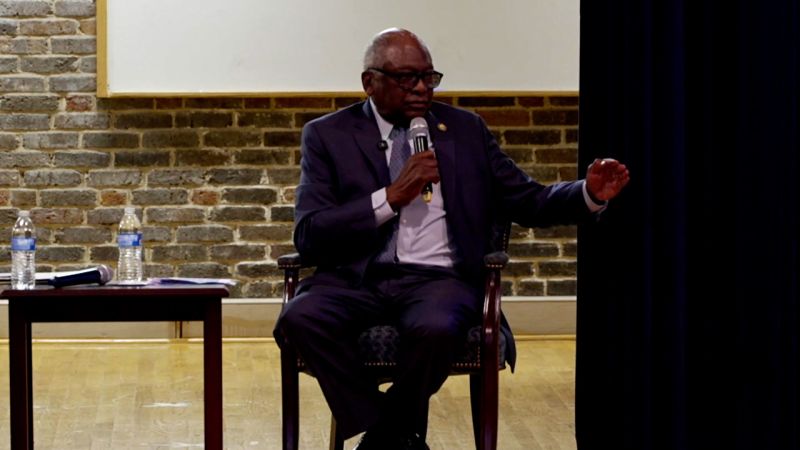In a recent town hall meeting held in South Carolina, veteran Congressman Jim Clyburn discussed the challenges that the Democratic Party faces while in the minority in Congress. Clyburn, who has served for many years, emphasized the importance of grassroots activism and urged those in attendance to be vocal, organized, and committed to change by voting. This essential act of making one’s voice heard is crucial for shifting the balance of power within the political landscape, as he believes it is unlikely that significant progress can be made without such engagement from the public.
The gathering saw a congenial crowd who engaged Congressman Clyburn with questions pertinent to a range of pressing issues, including taxes, Social Security, tariffs, and importantly, the constitutional implications of actions taken by the Trump administration. Many attendees expressed concern over how the administration was managing these various issues. One questioner pointedly addressed Clyburn about the administration’s handling of immigration and expressed fear that American citizens could soon face similar treatment. The concern for constitutional rights was palpable and highlighted the fear of governmental overreach.
In response, Clyburn provided a thorough explanation and took the opportunity to recite the 14th Amendment, reinforcing its significance. He underscored the value of town hall meetings as a forum for dialogue between representatives and their constituents. Furthermore, Clyburn implored the audience to reflect on historical cautionary tales, invoking the decline of democratic values in 1930s Germany. He passionately emphasized the need for vigilance in maintaining American democracy and urged his constituents to pray that the country avoid any resemblance to that dark chapter in history.
Clyburn echoed the sentiments of vigilance and activism by reciting a well-known quote from Martin Niemöller, a German Lutheran pastor who spoke against the atrocities committed during the Holocaust. This reference served as a stark reminder that the silence of the masses can lead to catastrophic consequences. The congressman invoked the memory of the six million Jews murdered during this tragic period, emphasizing the urgency of speaking out against injustices, regardless of political affiliation. He shared personal anecdotes about his upbringing, declaring that his fight was not aimed at Republicans per se, but rather against deceit and misinformation, a statement that resonated well with the crowd.
After the town hall, Clyburn was candid with CNN reporters, affirming his fears about the slide toward autocracy in the United States. Reflecting on his extensive history in civil rights activism, he articulated a profound sense of unease about the current political climate. Sharing a personal recollection from the civil rights movement, Clyburn spoke of his time incarcerated during the 1960s. He articulated a stark contrast with today’s judicial landscape, expressing doubt about whether contemporary courts would uphold justice as they may have in the past. This reflection served to underline his concerns over current political decisions and Supreme Court rulings that threaten civil liberties.
While numerous Democratic lawmakers have faced skepticism and even hostility during town halls questioning their effectiveness against President Trump, Clyburn’s meeting displayed a uniquely respectful and orderly environment. At the start of the event, he made it clear that he desired a civil discussion, which indeed characterized the forum. This tone facilitated a productive exchange of ideas and questions, contrasting sharply with the more chaotic atmospheres experienced by some of his peers.
In summary, Congressman Jim Clyburn’s town hall in South Carolina was a powerful reminder of the importance of civic engagement and the values inherent in American democracy. His messages of vigilance, reflection on history, and activism resonated with attendees, illustrating the necessity of speaking out against perceived injustices while maintaining a commitment to civil discourse. The meeting not only highlighted current political concerns but also served as a call to action for citizens to be actively involved in shaping their government’s future. This event underscored how vital town halls are as platforms for dialogue and collaboration in a functioning democracy.



